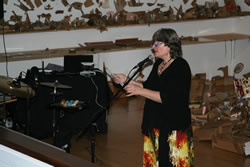[Talk]
6 Questions to Composer / Sound Artist Susan Frykberg
Susan Frykberg is a composer and poet who tries to balance spirituality, creativity and social justice. She has degrees in Electroacoustic Music and Theatre, Classics and Theology. She currently resides in New Zealand. She has taught at Simon Fraser University, Canada and has been a tutor or guest lecturer at a number of universities and colleges including Otago, Auckland and Victoria (New Zealand), Ontario College of Art (Toronto), the Emily Carr College of Art (Vancouver), RMIT and Box Hill Music Institute (both in Melbourne). She has studied with and been influenced by John Rimmer, Barry Vercoe, Barry Connyngham, John Cage, Iannis Xenakis, Barry Truax and priest and theologian Kevin McKone. Her CD is available from Earsay.
http://www.electrocd.com/en/bio/frykberg_su
[1] Briefly describe your musical / sound art background and education, formal and informal.
Studied briefly at Canterbury University (New Zealand) in music, then at Simon Fraser University (SFU) in Canada. I also attended many private summer schools, including those of Iannis Xenakis and John Cage. Much of my learning has been either self-directed, or collaborative, in cooperation with other composers / sound explorers and thinkers. At SFU, I was heavily influenced by the World Soundscape Project.

[2] Could you briefly describe your current musical / sound art activities, private, within the community, and public. Please indicate whether you view these as “professional”, “artistic” or other kinds of activities.
I have an ongoing performance practice with Ableton Live. New works are performed at festivals yearly, most recently at the ACMC, where I also gave a paper on “Sacred and Spiritual Electroacoustic Music” and took part in a panel discussion with Simon Emmerson and Warren Burt. I also coordinate a loose collective of improvising musicians — both acoustic and electroacoustic — called Let The Art Sing. We usually work in art galleries, interpreting the works. I do guest lectureships and have a radio program on Radio New Zealand Concert featuring electroacoustic music. These I consider professional activities. On a community level, I work in churches, creating alternate services using soundscapes, chant, prayer and scripture. I continue to do soundscape recordings.
[3] Please briefly describe your uses of technologies in your creative life. You may want to include a short description of the equipment and software / services you use (number of computers, phones, scanners, Facebook, Skype etc.), and comment on your use of mobile technologies compared to a few years ago.
For performance I use Ableton Live, a Macbook, Akai controllers LPK24 and LPD8, and a headset microphone, a Zoom H4 for sound recordings, Sibelius, Logic, Cubase. In a recent Ableton piece, I included a Wii controller for controlling live signal processing. I also have a slew of assorted software from a variety of sources. I have recently started using the apps by Nick Collins on my iPhone which I enjoy a lot. These include BBCUT and iGendyn. I use Facebook, Skype and YouTube on a regular basis and have recently been involved in the Hug the World global internet jam coordinated by Eldad Tsabary.
[4] How do you feel that the use of these technologies has contributed to those areas of your creative life where you employ them? You may also wish to comment on those that you don’t use (and the reasons). Do social media help or hinder in this?
I have always used technology in my music and sometimes think that if I’d devoted as much time to the violin as to multiple and ongoing software / hardware learning, I’d be Paganini! More seriously, by creating artworks with technology in an ongoing fashion, we provide a serious critique to the use of technology for control and consumerism and thereby offer a form of liberation from enslavement to it. For if you can “play” with something, it will never control you! I really like social media and find it a great way of keeping in touch with what is going on. I also find the YouTube clips on how to use the latest widget very helpful.
[5] Faceook, Myspace, YouTube, Skype, Twitter, Blogs … are part of the lingua franca of the students I meet every year. Are there ways for the older generation to use these technologies to communicate our values to those who were born after (about) 1988?
Well yes, just do it! (Nike is actually the Greek Goddess of Victory!) When I taught Logic to mainly young rock musicians, relatively recently, I found they seemed to be all learning the old music — Hendrix, the Beatles, etc. And then there are the Moog products in the stores. And Vinyl. So old is cool!! And good music is good music, whether it is written fifty or fifteen hundred years ago.
[6] Distribution of work used to be difficult to secure. Today with YouTube and Clouds, it is ubiquitous. Where it used to be difficult to find a copy of something, today, sometimes it is almost as difficult, not because it is not available, but because there are 1200 other (similar) competing items. Could you comment on how you see your work in this context now and in the future?
Well, I don’t think there is much problem here. I get notifications in the areas I’m interested in and I’m still always looking for new music, in all sorts of genre categories. I am still learning about Facebook Marketing and also crowd-funding, both of which I think are fantastic ways to go.
[7] Open area commentary.
When I first started in EA music, I was one of the few women. Now there are lots of us. However, I do think we offer something a bit different and we should hold onto that point of difference.
Sunday, 9 September 2012
Social top